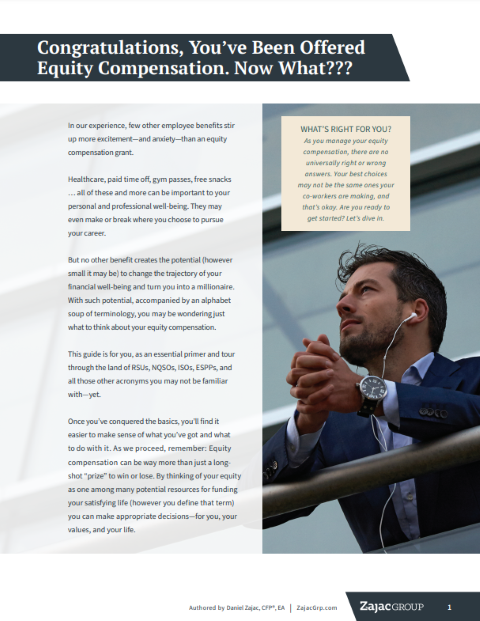When you think of “equity compensation,” you might think about incentive stock options, non-qualified stock options, and restricted stock units. If you dig even deeper, you may also think about tax implications, including the alternative minimum tax and qualified holding periods. Perhaps you’ve even thought about the possibilities of striking it rich as a senior executive or the possibilities of an IPO.
But the basics of equity compensation and tax aside, there’s something else you might want to be mindful of… something that is a bit more difficult to define or quantify. Namely, your emotions and how they may impact your equity compensation. Because, whether you realize it or not, your feelings often influence the decisions you make about your wealth.
Behavioral finance focuses on the idea that psychological influences and emotions can impact outcomes. While the data isn’t as black and white as other aspects of finance, the impact of behavioral finance is clear—just consider the Covid-induced crash in February 2020 or the meme stock phenomenon of 2021 (to name a few more recent events).
On a personal level, behavioral finance can influence how you view and manage your equity compensation. Your feelings, opinions, and thoughts can make it difficult when deciding about exercising, selling, and more, possibly meaning you may be tempted to avoid it altogether (which is often not the best course of action to take).
Let’s talk a bit about behavior finance as a whole, how it tends to impact those with equity compensation, and a few behavioral biases you may want to address.
Behavior Finance and Your Portfolio
So much of the concept of investing is about logic, math, and numbers. Yet, we’re not robots, and every person who participates in the market is impacted at least to some degree by their human side. Yes, large financial institutions are leveraging AI to analyze data and predict market movements—but ultimately, we see the markets move up and down based on how investors are feeling about certain companies, industries, sectors, geopolitical events, or even their own financial well-being.
All of this to say, the markets are volatile, and your portfolio can experience significant fluctuations because of it, particularly if you have a single stock position that makes up much of your wealth.
Making decisions based on short-term volatility is one prime example of how behaviors and emotions (nervousness, anxiety, stress, and fear of missing out) can often overtake logic, reason, and data-driven conclusions. It’s important to keep in mind that the stock market has a long history of recovering from even the most dramatic downturns, even though individual stocks may not. Of course, market recovery after a loss can take time (sometimes, more time than investors have), which is why building a portfolio that balances opportunities for growth with an appropriate level of stability and protection is critical. Asset allocation—meaning how your capital is divided among stocks, bonds, and cash—is the key to achieving that long-term portfolio performance and preservation, even as behaviors and emotions continue to impact greater market movements over time.
The Emotional Component of Equity Compensation
With equity compensation, it’s hard to ignore the emotions you may be feeling surrounding it. More than some investment product in your portfolio, your equity compensation is an extension of your professional life—a quantifiable representation of your career’s accomplishments.
It can be hard to set aside your emotions and make decisions that may feel like they’re going against what you worked so hard to earn. It’s possible those emotions may even impede your ability to act. Ultimately, those behaviors and emotions may lead you to avoid acting at all, instead choosing inaction over any action at all. Alternatively, you may act impulsively, basing decisions on how you feel at a particular moment in time (as opposed to what will serve you best over the long term).
Here are two common scenarios we see from those managing their equity compensation on their own:
Your company’s doing well, and as a result, you see the value of your shares rising. You think, “Why would I sell now?” and hope (even expect) it to continue rising.
Or, perhaps your company’s experiencing a period of contraction, and share prices are down. But you remember a time, in the not-so-distant past when they were higher. Rather than sell now, you’ll hold on and wait until it “gets back to where it was.” (Though, we know there’s no guarantee that’ll be the case).
In the moment, these conclusions may seem logical and sound—and it can be difficult to understand why or how they’re rooted in feelings. But share prices are unpredictable, and past performance doesn’t guarantee future results. Without a time machine, it’s impossible to know what your company’s stock will do in the future and when it will hit a peak or trough.
Let’s look at a few other common ways in which employees tend to bring behavioral biases and emotions into managing their equity comp.
“I Believe in My Company”
If you still work for your employer, the thought of selling shares of company stock may be a hard pill to swallow. You may feel like you’re betraying your employer, or otherwise indicating you don’t believe in the company and its future success—which is certainly not always the case.
Quite the opposite may even be true. Perhaps your employer has experienced immense growth and success since your shares have vested, and your portfolio is becoming overconcentrated as a result. Diversifying your portfolio is a fundamental component of long-term investing, and that may require you to sell some of your company stock—but that doesn’t mean you believe in your company any less.
“My Company’s Served Me Well, Why Would I Sell?”
Similar to the above, if your company has a long history of positive performance, you may feel foolish touching any part of your equity compensation.
“If they’ve helped me generate so much wealth, I’m sticking with it.”
But as we said before, past performance does not guarantee future performance—and it’s always worth considering your portfolio based on your own goals, needs, and risk tolerance. Simply “sticking with it” because a company’s treated you well so far may not necessarily serve as a solid and viable solution in the future. In fact, it could mean missing out on other investment opportunities or, again, remaining overconcentrated in one company’s stock.
“I Don’t Want to Deal with the Taxes”
One of the biggest concerns people have surrounding equity compensation is taxes. There’s no getting around it, the tax treatment of different equity compensation can be confusing—especially if you’re managing it on your own.
However, simply avoiding decisions about your equity comp because you’re concerned about the taxes involved is not the solution. Rather, being proactive and deliberate with your tax planning can help you make informed, careful decisions that potentially minimize or mitigate how much you ultimately end up owing.
We won’t go too far down the tax rabbit hole here, but if you’d like to learn more about how taxes impact your equity compensation, here are a few resources to check out next:
- How Incentive Stock Options May Be Taxed: And Some Caveats About Seeking A Qualified Disposition
- ESPP Tax Rules – And How They’re Affected by a Qualifying Disposition
- Rethinking Whether to Exercise and Hold Non-Qualified Stock Options for Long-Term Capital Gains Tax
“It Just Doesn’t Feel Real to Me”
For many, the reality of generating significant wealth from equity compensation is something that still has not sunk in. In fact, we’ve talked to some people who say their equity compensation doesn’t even feel real. While you’re certainly aware it’s there and worth something, you may not feel the same level of attachment and responsibility to it as other aspects of your wealth that you’ve had more hands-on interaction with (like a paycheck or bonus).
However, equity comp is a part of what you’re paid by an employer, just like a salary or commission. When managed thoughtfully and strategically aligned with the rest of your financial picture, it can help you build significant wealth over time and accomplish your biggest goals sooner than you may otherwise be able to.
Often, the byproduct of the above feelings is to avoid a decision at all, resulting in inaction, instead kicking the can until a future time and date when such action is required (such as the expiration of an employee stock option). However, no decision at all is a decision in and of itself. Financial inaction could result in more wealth should the stock price increase, but it could also lead to financial ruin in a worst-case scenario.
3 Common Behavioral Biases (And How to Address Them)
Within the realm of behavioral finance, behavioral and emotional biases exist. Both at large and on an individual basis, these biases have the power to impact an investor’s decision-making (whether they realize it or not).
Here are a few common behavioral biases to consider for clients with equity compensation—plus some important food for thought on how to avoid them.
#1: Anchoring Bias
We touched on the idea of “anchoring” earlier, particularly as it applies to equity compensation.
But generally speaking, anchoring refers to an investor’s inclination to base their decisions on pre-existing information that is often irrelevant and arbitrary—or sometimes, simply on the first information they find. In essence, anchoring enables investors to compare a price or decision today to something they’ve known to be previously true.
Within the world of investing, here’s what anchoring can look like:
Let’s say you have equity compensation. The prior share price was $100, and its current share price is $75. You may want to hold your stock “until it gets back to $100.” When in reality, the prevailing and future market conditions may never warrant the price reaching $100 per share.
Now, what can you do to identify anchoring when it’s happening and try to avoid it? This is a tough one, especially since it’s prevalent in so many areas of your financial life. Simply being aware of what anchoring is and trying to identify it in real time is a good first step. Get in the habit of scrutinizing any anchor price or value you come across, and maintain your own criteria and goals as a top priority.
#2: Recency Bias
With recency bias, an investor will put more emphasis and importance on events that have happened recently—particularly when it comes to predicting future market movements.
It’s the prime reason why we, collectively as investors, think we can accurately guess what will happen based on what’s been happening.
For example, if Company A’s stock has been performing well over the past six months and Company B’s has been falling during that same time frame, an investor with recency bias might assume Company A has a better chance at future positive performance.
Recency bias can cause investors to view data with a narrow lens—whereas a wide-angle approach is often more appropriate.
For example: Prior to Covid-19, investors enjoyed the longest bull market in stock market history which lasted from March 2009 until February 2020 (almost 11 years ). During this time, the S&P 500 went from a low of 676.53 points to 3,386.15—a 400%+ in gains.1
Enjoying such an extended period of growth may have made it difficult for investors to remember a time when the market was truly volatile—especially if young investors had yet to experience a downturn themselves. When Covid hit and the bull market abruptly ended, many investors felt blindsided and unprepared for the volatility. Yet, if we pull back the lens and look at market performance over a greater period of time—say the last 50 years instead of the last 11—volatility is a normal part of the market cycle and should be expected.
#3: Familiarity Bias
As humans and investors, we like what we know—even if there are better (albeit unfamiliar) options out there. This is called familiarity bias.
In terms of equity comp, sometimes familiarity bias can make it difficult for employees to sell shares—what do they know more intimately than the company they work for, after all?
Aside from remaining invested (and possibly overconcentrated) in your employer stock, you may feel inclined to only invest in companies you’ve heard of before, industries you understand (like energy or healthcare), or regions of the world you’re comfortable with (like the U.S. or Europe).
While it’s good to know what you’re investing in, the familiarity bias can be limiting and may make it difficult to achieve your long-term investment goals. It may also lead to a lack of diversification in your portfolio, and missed opportunities that align with your risk tolerance and other criteria.
On the other end of the spectrum, familiarity bias can lead investors to feel overconfident in their portfolio’s abilities, because they’re familiar and comfortable with the companies or sectors they’re invested in—they feel as though they can’t possibly be “let down” by things they know and understand (despite actual market or financial performance).
To avoid familiarity bias, you’ll need to work on being objective and goal-focused when making decisions regarding your portfolio. This is one bias in particular where working with a financial professional may be especially beneficial. As a disinterested third party, an advisor can help you analyze investment opportunities based on financial merit (as opposed to familiarity).
Understanding and Addressing Your Behavioral Biases
The bottom line? You’re only human—and it’s safe to assume that someway, somehow, your own biases and emotions may impact the decisions you make about your money, equity comp, and other investments.
The key is to familiarize yourself with what may be triggering an emotional response (such as a market downturn or upturn) and work with an advisor to make data-driven decisions based on your unique needs and long-term goals.
If you’d like to speak to someone on our team about managing your equity compensation, don’t hesitate to send us a message today.












0 Comments